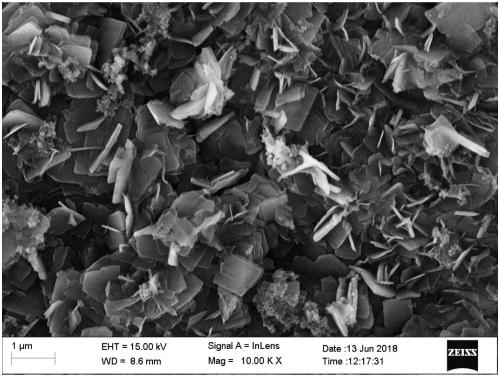Organic-inorganic hybrid adsorbent with hierarchical structure, preparation method and application thereof
A hierarchical structure, adsorbent technology, applied in inorganic chemistry, chemical instruments and methods, adsorbed water/sewage treatment, etc., can solve the problems of loss, easy agglomeration, difficult separation, etc.
- Summary
- Abstract
- Description
- Claims
- Application Information
AI Technical Summary
Problems solved by technology
Method used
Image
Examples
Embodiment 1
[0077] Add 1.0 g macroporous cation exchange resin to 0.1 L Tris-HCl buffer solution, 0.2 g of (HO) 2 C 6 h 3 CH 2 CH 2 NH 2 · HCl, 0.1 g CuSO 4 ·5H 2 O and 0.25 mL 30% HO 2 o 2 , react in the dark at room temperature for 40 minutes, filter out solid phase particles A; add A to FeSO 4 In the solution, react at room temperature for 4 hours, and filter out solid-phase particle B; add B to a PBS buffer solution containing cysteine protease, and react at room temperature for 6 hours to prepare an adsorbent;
[0078] Among them, the pH of Tris-HCl buffer solution is 9, FeSO 4 The solution concentration is 0.2mol / L, the pH of the PBS buffer solution is 7.2, and the concentration of cysteine protease is 1g / L.
[0079] The lead concentration in lead-containing water is 200mg / L;
[0080] Get above-mentioned leaded water 0.5L and place in the beaker, add 0.5g adsorbent, after stirring and reacting for 6 hours, filter and separate the adsorbent, record the lead concentrati...
Embodiment 2
[0083] Add 0.5 g macroporous cation exchange resin to 0.1 L Tris-HCl buffer solution, 0.3 g of (HO) 2 C 6 h 3 CH 2 CH 2 NH 2 · HCl, 0.2 g CuSO 4 ·5H 2 O and 0.4 mL 30% HO 2 o 2 , react in the dark at room temperature for 30 minutes, filter out solid phase particles A; add A to FeCl 2In the solution, react at room temperature for 2 hours, and filter out the solid-phase particles B; add B to the PBS buffer solution containing cysteine protease, and react at room temperature for 4 hours to prepare the adsorbent;
[0084] Among them, the pH of Tris-HCl buffer solution is 8, FeCl 2 The concentration of the solution was 0.02 mol / L, the pH of the PBS buffer solution was 7.6, and the concentration of cysteine protease was 5 g / L.
[0085] The lead concentration in lead-containing water is 1mg / L;
[0086] Take 0.06g of adsorbent and add it into a Φ8mm glass tube, pass 0.2L of the above lead-containing water from the bottom of the glass tube, and flow out from the top, and...
Embodiment 3
[0089] To 0.1L Tris-HCl buffer solution, add 1.5g macroporous cation exchange resin, 0.25g (HO) 2 C 6 H 3 CH 2 CH 2 NH 2 HCl, 0.15g CuSO 4 ·5H 2 O and 0.3 mL of 30% H 2 O 2 , react in the dark for 38 minutes at room temperature, filter out solid phase particle A; add A to FeSO 4 In the solution, react at room temperature for 3.5 hours, and filter out the solid-phase particles B; add B to the PBS buffer solution containing cysteine protease, and react at room temperature for 5 hours to prepare the adsorbent;
[0090] Among them, the pH of Tris-HCl buffer solution is 8.6, FeSO 4 The concentration of the solution was 0.16 mol / L, the pH of the PBS buffer solution was 7.4, and the concentration of cysteine protease was 0.5 g / L.
[0091] The lead concentration in lead-containing water is 50mg / L;
[0092] Take 0.2L of the above-mentioned lead-containing water and place it in a beaker, add 0.1g of adsorbent, and after aeration with air for 2 hours, filter and separate o...
PUM
| Property | Measurement | Unit |
|---|---|---|
| diameter | aaaaa | aaaaa |
| adsorption capacity | aaaaa | aaaaa |
| concentration | aaaaa | aaaaa |
Abstract
Description
Claims
Application Information
 Login to View More
Login to View More - R&D
- Intellectual Property
- Life Sciences
- Materials
- Tech Scout
- Unparalleled Data Quality
- Higher Quality Content
- 60% Fewer Hallucinations
Browse by: Latest US Patents, China's latest patents, Technical Efficacy Thesaurus, Application Domain, Technology Topic, Popular Technical Reports.
© 2025 PatSnap. All rights reserved.Legal|Privacy policy|Modern Slavery Act Transparency Statement|Sitemap|About US| Contact US: help@patsnap.com

